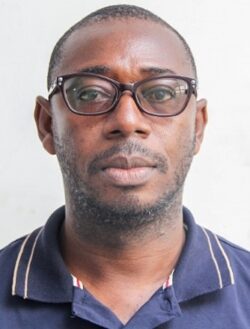Two RTAC Researchers Committed to Universal Health Coverage
POSTED December 10, 2021
|Democracy, Human Rights and Governance, Global Health
In recognition of International Universal Health Coverage Day, the Research Technical Assistance Center (RTAC) is highlighting network members who are working in the field of public health and share an interest in the United Nations General Assembly’s 2012 call for universal health coverage for all members of society. The December 12 commemoration, “aims to raise awareness of the need for strong and resilient health systems and universal health coverage with multi-stakeholder partners.” The two featured experts, Dr. Stephen Apanga and Dr. Anne Fitzpatrick, have different experiences, expertise, and opinions to offer in the field of public health practices and policies, but both remain advocates of the benefits of a world that embraces universal health care coverage.
Dr. Stephen Apanga is a Senior Lecturer at the University for Development Studies in Tamale, Ghana. By training, he is a public health physician and researcher with expertise in infectious diseases and health systems research, particularly primary health care. Primary health care refers to an all-encompassing approach to health care that addresses the main health problems in a community, providing promotive, preventive, curative, and rehabilitative services accordingly, at a cost that the community and country can afford.
is a Senior Lecturer at the University for Development Studies in Tamale, Ghana. By training, he is a public health physician and researcher with expertise in infectious diseases and health systems research, particularly primary health care. Primary health care refers to an all-encompassing approach to health care that addresses the main health problems in a community, providing promotive, preventive, curative, and rehabilitative services accordingly, at a cost that the community and country can afford.
Dr. Apanga’s decision to become a public health practitioner is rooted in an appreciation for primary health care and stemmed from witnessing two disease outbreaks that devastated rural communities in northern Ghana due to lapses in the health system. “It has since then been my dream to help improve the health system through primary health care implementation research and to adopt a system thinking approach of training health personnel as future health leaders. I feel so fulfilled when the outcome of my research activities are scaled up to the national level with a resultant improvement in the overall health system,” proclaimed Dr. Apanga.
Dr. Apanga believes that universal health coverage is a human right. “Everyone irrespective of their socioeconomic status should have access to quality health care without experiencing any form of financial hardship. Attaining universal health coverage, particularly in the developing world is crucial as evidence has shown that people have been pushed below the poverty line whilst accessing health care due to out-of-pocket payment.”
Currently, he is developing a system for measuring and monitoring the progress of the primary health care system towards attaining universal health coverage in Ghana. He hopes that this scientific approach will be appealing to policymakers to make a lasting change in his country.
When asked to reflect on COVID-19 and its impact on Ghana and the world, Dr. Apanga thoughtfully responded that the pandemic exposed the weaknesses in global health systems, but it also offered the opportunity for the scientific, medical, and political communities to work together and leverage resources towards building resilient health systems that will be able to contain future pandemics.
“I was pleased to see the urgency with which multi-stakeholders being driven by science, collaborated to contain this pandemic. I was also pleased to see how hygiene and sanitation, together with health education and promotion, which are mainly primary health care initiatives, took a center stage as good practices of containing the pandemic,” stated Dr. Apanga.
However, Dr. Apanga believes more attention should be given towards strengthening primary health care systems and making them more resilient, as this can help mitigate the devastating effects of pandemics at the community level. Dr. Apanga assures, “The future of universal health care looks very bright as most countries have embraced this concept and are increasingly adapting primary health care as a key strategy for attaining this.”
 Dr. Anne Fitzpatrick is an Assistant Professor of Economics at the University of Massachusetts Boston. Her research focuses on finding and evaluating policies to improve the quality of health and education in developing countries and spans a wide variety of topics including health insurance, maternal mortality, substandard medicines, the private sector for anti-malarial drugs, and COVID-19. Her specialty however is in designing and implementing large-scale randomized interventions.
Dr. Anne Fitzpatrick is an Assistant Professor of Economics at the University of Massachusetts Boston. Her research focuses on finding and evaluating policies to improve the quality of health and education in developing countries and spans a wide variety of topics including health insurance, maternal mortality, substandard medicines, the private sector for anti-malarial drugs, and COVID-19. Her specialty however is in designing and implementing large-scale randomized interventions.
Dr. Fitzpatrick’s passion and interest in discovering ways to improve health access and equity worldwide drove her to become an economics professor who focuses on health. She enjoys the opportunities her work provides in not only being able to help others, but the ability to do fieldwork and learn how cultures and traditions impact public health initiatives.
The UMass Boston professor believes universal health coverage is essential for all people worldwide. “All individuals deserve to have an equal opportunity to grow and thrive in their environments. However, how to achieve this goal is uncertain, and the health issues facing each country, region, and village may differ. Although health inequality may seem to be an insurmountable problem, we must continue to work on discovering and implementing effective strategies because all individuals are worthy of access to high-quality health care,” she states. It is this belief, that drives her research and encourages her to find new ways to improve health care access and ultimately health outcomes globally.
When asked to reflect on how the COVID-19 pandemic has changed the world, she spoke of the ways how the world has changed. “Despite the immense losses that have been felt worldwide, there may also be slivers of hope. One sliver of hope is that through technology and the hard work of so many scientists, several safe and effective COVID-19 vaccines were able to be developed, manufactured, and deployed on a large scale. However, access and willingness to accept this life-saving technology remains uneven worldwide. I hope that we can improve the availability and acceptance of COVID-19 vaccines globally, as that will be an important step to ending, rebuilding, and ultimately recovering from this pandemic.”
